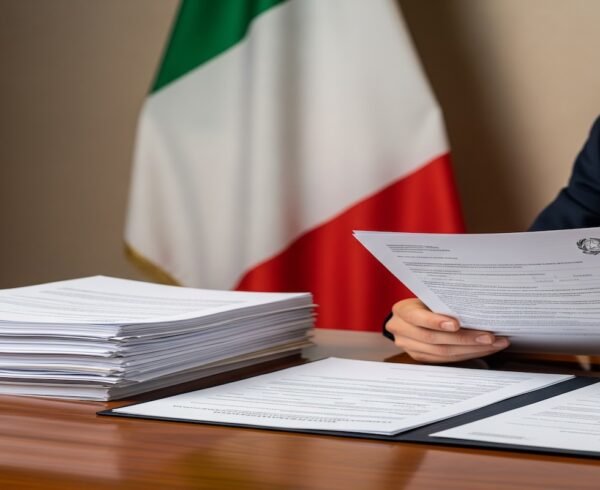Unregistered cohabitation is a stable relationship between two persons. This type of cohabitation is recognized by Italian laws and must not be proven by any official document. The European Union has established that cohabitation can actually be tried by any means because it is not made official by cohabitants.
However, in Legislative Decree 30/2007, the Italian State has continued to ask to officially demonstrate the “de facto” cohabitation. In this regard, the EU sanctioned Italy with the 2011/2053 infringement procedure, for the incorrect transposition of Directive 2004/38 / EC and reiterates that “the stable relationship must be proven by any means”.
In 2012, Italy has tried to overcome the objections raised by the European Commission, but has continued to require official documentation to document the cohabitation. The provision has created a bureaucratic paradox in cases of “de facto” cohabitation between an Italian citizen and a non-EU cohabitant. In fact, one of the officially required means of proving “de facto” cohabitation is the Registry office, but:
- The non-EU cohabitant of an Italian citizen who does not have a residence permit cannot register in the registry and declare cohabitation;
- In order for the non-EU cohabitant of an Italian citizen to apply for a residence permit, he must have a declaration of cohabitation;
- The declaration of cohabitation cannot be obtained if the person is not registered at the Registry office.
And here is the bureaucratic short-circuit, which can only be overcome with adequate judicial action to the opposition of the Public Administration. We have already explored the issue of the difference between “de facto” cohabitation and registered cohabitation, and we have specified in other articles the following:
- The immigration decrees issued by Minister Salvini have unconstitutionality profiles;
- The residence permit must be recognized in the presence of a stable cohabitation (see HERE);
- The verification of cohabitation between a non-EU citizen and an Italian citizen is an essential condition for the issue of a residence permit;
- The registration to the registry office is a requirement to verify the cohabitation between an Italian citizen and a non-EU cohabitant;
- The residence permit is also issued under the cohabitation rule (see HERE);
When family reunification can be requested in the presence of a stable relationship
In summary, a non-EU citizen in a stable relationship with an Italian citizen, can request and obtain the issuance of the residence permit through the rights that the Italian law recognizes to the partner equal to the spouse, provided that there are no serious and proven reasons that hinder the issue.
The regulatory framework is anything but stable and due to a variety of factors is constantly changing. Therefore, we will try to clarify how and when a stable relationship with an Italian citizen must guarantee the residence permit in Italy for the non-EU cohabitant.
EU law and EU infringement procedures against Italy on the Right to Immigration
- On the part of the EU Commission, Italy has suffered infringement procedures against Directive 2004/38 / EC, for the rules concerning the free movement of persons.
- The directive guarantees entry and residence in each EU Member State, of citizens of other Member States and their family members even if they do not have EU citizenship.
The law with which Italy has transposed the Directive is not in conformity and among the observations raised by the Commission is the one in art. 3, par. 2, lett. b) of the Directive. This article establishes that the right of entry and residence of a European citizen in an EU Member State is also recognized to the non-EU partner, provided that a stable relationship exists between the two persons.
What the community law declares with respect to the stable relationship duly attested
Community law requires that the element of the “stable relationship” be proved, but does not indicate which specific evidence is required in this regard. Conversely, the art. 3, co. 2, lett. b) of Legislative Decree 30/07, introduces in this regard a precise selection of evidences admitted to ascertain the “stable relationship.” On this point, even the recent Italian jurisprudence provides that the stable relationship can be proven by providing evidence such as:
- a common life project;
- the existence of a common current account;
- the co-participation of each of the cohabitants in family expenses;
- the provision of mutual assistance to cohabitation.
All these elements of proof must be assessed as a whole and one by the others.
Art. 3, co. 2, lett. b) of Legislative Decree 30/07, states that the relationship between the citizen of the Member State and its non-EU partner must be officially attested. Therefore, under Italian law, the “stable relationship” must necessarily be demonstrated by official documents produced by the State Authorities.
The restrictions imposed on the stable relationship and differences with the registered relationship
The current tendency of the Italian State to contain the phenomenon of migration has created a series of restrictions regarding the issuance of the residence permit. (See HERE oppositions to the Salvini Security Decree).
However, completing its course, some sentences of the Italian High Courts have renewed the regulatory framework, with respect to the rights for cohabitants more uxorio and valid also for the issue of the residence permit.
The sentence of the Court of Cassation Sec. VI penalty n. 11476 of March 14, 2019
The means with which to demonstrate stable cohabitation not registered are various, not only as regards the right to immigration, the issuance of the residence permit or citizenship, in favor of the non-EU cohabitant. The Jurisprudence also uses every means to prove that two persons live together.
In fact, there have been cases in which the Italian Court of Cassation has been able to demonstrate the stable cohabitation between two persons, to evaluate the crime of aiding and abetting.
Conclusions
The Italian State does not easily grant the residence permit to the non-EU cohabitant of an Italian citizen, in a stable but not registered relationship. However, based on the law of the European Union and on the basis of Italian Jurisprudence, recourse to the Judge allows non-EU cohabitants to prove that they live together with an Italian citizen and obtain permission to stay in Italy.

















